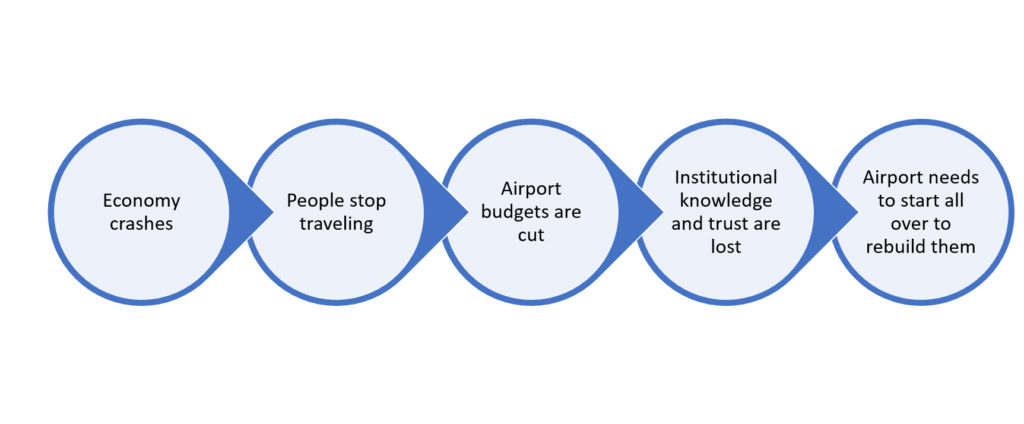Silver linings: Is the recession an opportunity to build community relationships around airport noise?
03.13.2020 | HMMH |Over the last week, as we’ve stocked up on toilet paper and hand sanitizer, watched our 401k accounts hemorrhage, and rushed to develop worst-case scenario business plans, I’ve been giving some thought to what we can learn from the past. I have had the (mis)fortune to have lived and worked through several economic cycles now.
How the economic recession will impact airport noise programs
Let’s take, for example, airport noise. We old-timers know how this will play out:
- As the economy crashes, people stop traveling (and in this case, global pandemics hasten that).
- When people stop traveling, funds stop flowing to airports – not just from airlines but from concessions, parking, etc.
- When airport budgets get cut, the first place they look is ‘non-essential’ spending, which normally includes noise: monitoring systems, noise office staff, anything that smells of research, and yes – noise consultants.
- When budgets and staff get cut, both institutional knowledge and community trust are lost.
- When knowledge and trust are lost, the airport needs to start all over to rebuild them – and usually in the context of needing something from the community – which is a recipe for disaster (see our recent experience with community engagement for capacity expansion or PBN implementation).
I would like to make the argument that we think carefully about our responses to these very real economic threats, as they have both short- and long-term consequences.
Let’s not lose another entire generation of talent. If you’ve been to any conference in the last few years, the leading topic of conversation has been the lack of talent in the workforce. If you dig deeper, most people will tell you that while they are having trouble attracting entry-level professionals, the real struggle is finding folks with 10-12 years’ experience. Why is this? Well, that’s because in the recession of 2008-9, we let nearly an entire generation of people go (i.e., the ones who were then entry-level, and now would have 10-12 years’ experience). While a few really passionate folks held on (for example, changing their career aspirations to be professional pilots to being federal government employees), most found something else to do – especially when the tech economy came back more quickly than municipal and consulting jobs, and those companies were offering sexy amenities (e.g., casual Friday, foosball tables, all the caffeine you could get your hands on 24/7). Let’s find ways to hold on to the amazing talent we have now.

Let’s not shut down noise efforts that are finally making progress. In a number of presentations, I have described our recent situation in aviation noise as a “perfect storm” resulting from the confluence of: (1) increased air traffic resulting from economic demand; (2) community response to change resulting from the implementation of Next-Gen aircraft procedures, new runways, etc. (i.e., putting airplanes in places they didn’t used to be); and (3) the ability of communities to use social media to develop a concerted, national opposition to aviation development (and here, I would argue, the aviation industry is still fragmented, despite having pre-existing networks to do this – but that’s a topic for another discussion). I have joked (derisively) that the only thing that will actually reduce aircraft noise levels quickly is a good recession. Well, here we are. We – airports, industry, the FAA, and communities – have spent a very painful few years engaged in efforts to understand each other’s perspectives, to define common objectives, to appreciate constraints, and to start developing solutions. I would argue that the single most important factor that has contributed to the small amount of success we’ve had is that we have invested time to develop relationships and trust. In some cases, after years of contentious roundtable meetings, Congressional bills, and lawsuits, we are finding success in working collaboratively to find solutions. I know that if those relationships are disrupted by a ‘stop-work order’ or a ‘temporary pause’ that lasts until the economy comes back, we’ll find ourselves in the same old place: starting from scratch to rebuild. Instead, let’s think about using this relative quiet productively to have an even more rational dialog that is focused on the long-term. We will serve the industry – and our neighbors – better.





